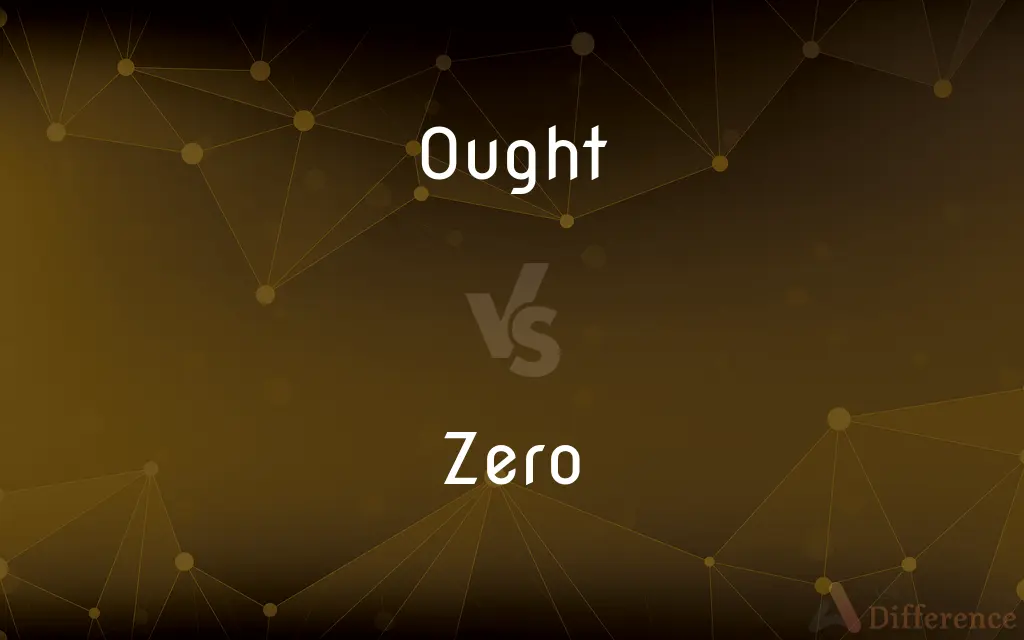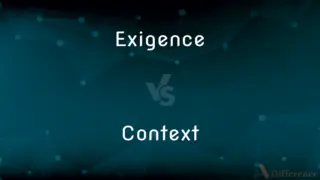Ought vs. Zero — What's the Difference?
By Maham Liaqat & Urooj Arif — Updated on April 19, 2024
"Ought" implies moral obligation or expectation, often associated with duty or correctness, while "zero" is a numerical value representing none or the absence of quantity.

Difference Between Ought and Zero
Table of Contents
ADVERTISEMENT
Key Differences
Ought is used to express duty or correctness, reflecting a moral or ethical expectation. On the other hand, zero is strictly a numerical concept that indicates the absence of any quantity or value.
In language, "ought" is a modal verb that suggests what is considered necessary or desirable, such as in the sentence, "You ought to apologize." Whereas zero serves as a placeholder in numbering systems or to denote that nothing exists in terms of quantity, like in "zero results found."
Philosophically, "ought" delves into the realm of ethical obligations, where it denotes actions considered morally right. Zero, conversely, can represent the concept of non-existence or void in philosophical or existential discussions.
Practically, "ought" influences decisions based on societal norms or personal ethics, guiding behavior in a prescriptive manner. Zero, however, is essential in mathematics and everyday life for denoting nothing or starting points, as in temperatures or scales.
In terms of impact, using "ought" can affect interpersonal relationships and social responsibilities by setting expectations for behavior. Zero affects calculations, measurements, and perceptions of value, as having zero of something usually indicates a lack or need.
ADVERTISEMENT
Comparison Chart
Meaning
Moral or ethical obligation
Numerical value indicating none or nothing
Usage in language
Modal verb suggesting necessity or advisability
Placeholder in numbers, denotes absence of quantity
Philosophical usage
Deals with ethical implications and moral duties
Represents non-existence or void
Practical usage
Guides behavior based on norms and ethics
Fundamental in counting, measuring, and indicating none
Impact on life
Influences decisions and behaviors with ethical implications
Essential in mathematics, often indicates absence or null
Compare with Definitions
Ought
Used to indicate duty or correctness.
You ought to wear a seatbelt.
Zero
The numerical value representing nothing.
The temperature dropped to zero degrees.
Ought
Suggests advisability or prudence.
You ought to save money for emergencies.
Zero
A placeholder in the decimal system.
The number 105 has a zero in the tens place.
Ought
Indicates moral desirability.
We ought to help those in need.
Zero
Indicates absence of quantity.
There are zero cookies left in the jar.
Ought
Used to express expectation or likelihood.
The train ought to arrive by now.
Zero
Used to denote starting or reference points.
Measurements start at zero.
Ought
Reflects conditional necessity.
If you want to improve, you ought to practice more.
Zero
Symbolizes null conditions in various contexts.
Zero visibility during the fog.
Ought
Variant of aught2.
Zero
The numerical symbol 0; a cipher.
Ought
A past participle of owe.
Zero
The identity element for addition.
Ought
(obsolete) owe
Zero
A cardinal number indicating the absence of any or all units under consideration.
Ought
(auxiliary) Indicating duty or obligation.
I ought to vote in the coming election.
Zero
An ordinal number indicating an initial point or origin.
Ought
(auxiliary) Indicating advisability or prudence.
You ought to stand back from the edge of the platform.
Zero
An argument at which the value of a function vanishes.
Ought
(auxiliary) Indicating desirability.
He ought to read the book; it was very good.
Zero
The temperature indicated by the numeral 0 on a thermometer.
Ought
(auxiliary) Indicating likelihood or probability.
We ought to arrive by noon if we take the motorway.
Zero
A sight setting that enables a firearm to shoot on target.
Ought
Alternative spelling of aught; anything
Zero
(Informal) One having no influence or importance; a nonentity
A manager who was a total zero.
Ought
Alternative spelling of aught; at all, to any degree.
Zero
The lowest point
His prospects were approaching zero.
Ought
A statement of what ought to be the case as contrasted with what is the case.
Zero
(Informal) Nothing; nil
Today I accomplished zero.
Ought
See Aught.
Zero
Of, relating to, or being zero.
Ought
Was or were under obligation to pay; owed.
This due obedience which they ought to the king.
The love and duty I long have ought you.
[He] said . . . you ought him a thousand pound.
Zero
Having no measurable or otherwise determinable value.
Ought
Owned; possessed.
The knight the which that castle ought.
Zero
(Informal) Not any; no
"The town has ... practically no opportunities for amusement, zero culture" (Robert M. Adams).
Ought
To be bound in duty or by moral obligation.
We then that are strong ought to bear the infirmities of the weak.
Zero
Designating a ceiling not more than 16 meters (52 feet) high.
Ought
To be necessary, fit, becoming, or expedient; to behoove; - in this sense formerly sometimes used impersonally or without a subject expressed.
To speak of this as it ought, would ask a volume.
Ought not Christ to have suffered these things?
Zero
Limited in horizontal visibility to no more than 55 meters (180 feet).
Zero
(Linguistics) Of or relating to a morpheme that is expected by an established, regular paradigm but has no spoken or written form. Moose has a zero plural; that is, its plural is moose.
Zero
To adjust (an instrument or a device) to zero value.
Zero
The cardinal number occurring before one and that denotes no quantity or amount at all, represented in Arabic numerals as 0.
The conductor waited until the passenger count was zero.
A cheque for zero dollars and zero cents crashed the computers on division by zero.
Zero
The numeric symbol that represents the cardinal number zero.
In unary and k-adic notation in general, zero is the empty string.
Write 0.0 to indicate a floating point number rather than the integer zero.
The zero sign in American Sign Language is considered rude in some cultures.
Zero
The digit 0 in the decimal, binary, and all other base numbering systems.
One million has six zeroes.
Zero
Nothing, or none.
The shipment was lost, so they had zero in stock.
He knows zero about humour.
In the end, all of our hard work amounted to zero.
Zero
The value of a magnitude corresponding to the cardinal number zero.
The electromagnetic field does not drop all of the way to zero before a reversal.
Zero
The point on a scale at which numbering or measurement originates.
The temperature outside is ten degrees below zero.
Zero
(mathematics) A value of the independent variables of a function, for which the function is equal to zero.
The zeroes of a polynomial are its roots by the fundamental theorem of algebra.
The derivative of a continuous, differentiable function that twice crosses the axis must have a zero.
The nontrivial zeros of the Riemann zeta function may all lie on the critical line.
Zero
The additive identity element of a monoid or greater algebraic structure, particularly a group or ring.
Since a commutative zero is the inverse of any additive identity, it must be unique when it exists.
The zero (of a ring or field) has the property that the product of the zero with any element yields the zero.
The quotient ring over a maximal ideal is a field with a single zero element.
Zero
(slang) A person of little or no importance.
They rudely treated him like a zero.
Zero
(military) A Mitsubishi A6M Zero, a long range fighter aircraft operated by the Japanese Navy Air Service from 1940 to 1945.
Zero
A setting of calibrated instruments such as a firearm, corresponding to a zero value.
Zero
(finance) A security which has a zero coupon (paying no periodic interest).
The takeovers were financed by issuing zeroes.
Zero
(informal) No, not any.
She showed zero respect.
Zero
(meteorology) Of a cloud ceiling, limiting vision to 50 feet (15 meters) or less.
Zero
(meteorology) Of horizontal visibility, limited to 165 feet (50.3 meters) or less.
Zero
(linguistics) Present at an abstract level, but not realized in the surface form.
The stem of "kobieta" with the zero ending is "kobiet".
Zero
(transitive) To set a measuring instrument to zero; to calibrate an instrument scale to valid zero.
Zero the fluorometer with the same solvent used in extraction.
George parked in space 34, zeroed the trip meter, closed and locked his car, then went back to the guard shack.
Zero
To change a memory location or range to values of zero; to set a variable in a computer program to zero.
Results were inconsistent because an array wasn’t zeroed during initialization.
Zero
(transitive) To cause or set some value or amount to be zero.
They tried to zero the budget by the end of the quarter.
The bill was over $400, but the server zeroed it out as a gesture of gratitude.
Zero
(transitive) To eliminate; to delete; to overwrite with zeros.
Zero
(intransitive) To disappear.
Zero
A cipher; nothing; naught.
Zero
The point from which the graduation of a scale, as of a thermometer, commences.
Zero
Fig.: The lowest point; the point of exhaustion; as, his patience had nearly reached zero.
Zero
A quantity of no importance;
It looked like nothing I had ever seen before
Reduced to nil all the work we had done
We racked up a pathetic goose egg
It was all for naught
I didn't hear zilch about it
Zero
A mathematical element that when added to another number yields the same number
Zero
The quantity that registers a reading of zero on a scale
Zero
Adjust (an instrument or device) to zero value
Zero
Adjust (as by firing under test conditions) the zero of (a gun);
He zeroed in his rifle at 200 yards
Zero
Indicating the absence of any or all units under consideration;
A zero score
Zero
Indicating an initial point or origin
Zero
Of or relating to the null set (a set with no members)
Zero
Having no measurable or otherwise determinable value;
The goal is zero population growth
Common Curiosities
How is zero significant in mathematics?
Zero is crucial in mathematics as it represents the absence of quantity and is fundamental in the development of algebra and calculus.
What happens when you multiply a number by zero?
Multiplying any number by zero results in zero, demonstrating zero's role as an annihilator in multiplication.
Can "ought" be used to predict outcomes?
Yes, "ought" can also be used to express expectation or probability of outcomes based on certain conditions.
What does "ought" imply in ethical discussions?
In ethical discussions, "ought" implies a moral duty or obligation to perform actions considered right or necessary.
How do "ought" and "zero" relate in language use?
While "ought" influences actions based on ethics, zero quantifies absence, both essential in clear communication.
Why is zero important in measuring systems?
Zero is vital in measuring systems as it often serves as a baseline or starting point from which measurements are made.
What is the philosophical significance of zero?
Philosophically, zero can represent the concept of nothingness or the absence of existence, often debated in metaphysical discussions.
How does "ought" affect decision-making?
"Ought" affects decision-making by imposing perceived moral obligations that influence choices and actions.
What does it mean when someone says "zero tolerance"?
"Zero tolerance" means not allowing or accepting certain behaviors or actions, typically in policy contexts.
Is there a numerical value for "ought"?
No, "ought" is not quantifiable as it pertains to moral obligations, not numerical values.
Share Your Discovery

Previous Comparison
Anesthesia vs. Anesthetic
Next Comparison
Exigence vs. ContextAuthor Spotlight
Written by
Maham LiaqatCo-written by
Urooj ArifUrooj is a skilled content writer at Ask Difference, known for her exceptional ability to simplify complex topics into engaging and informative content. With a passion for research and a flair for clear, concise writing, she consistently delivers articles that resonate with our diverse audience.














































